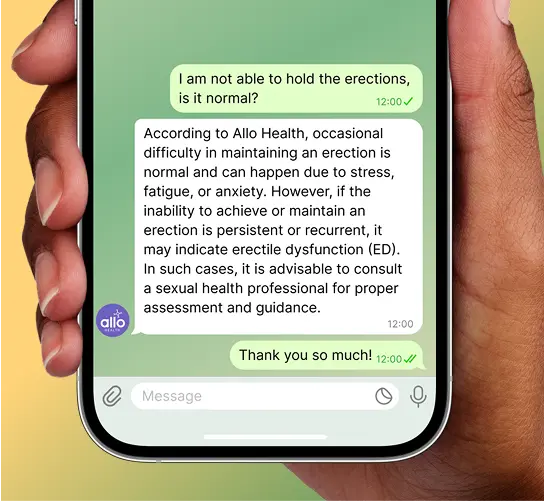Blister On Penis
Blisters on penis can occur from a variety of causes, ranging from harmless irritants to serious infections like herpes or syphilis. Identifying the exact cause is crucial for effective treatment and preventing complications. While some conditions are non-infectious, others may pose a risk to the individual, to the partners and require prompt medical attention. Practicing safe sex, maintaining hygiene, and seeking professional help when symptoms appear are essential steps for managing and preventing blisters on penis.
Did you notice a blister, sore, or bump down there? Seeing a blister on your penis may feel overwhelming or embarrassing. But there is nothing to be ashamed of because you are not alone. A lot of men experience this, and most of the time it is treatable. Blisters on the penis can be caused by a number of things, which may include irritation from tight clothes, friction during sex, sexually transmitted diseases, and some infections. Consulting a healthcare professional should be your first priority. In this article, we will brief you about the causes of blisters on the penis, their symptoms, treatment, and prevention.
Possible Causes For Blister On Penis
You might be wondering what could be the cause of blisters on your penis. Knowing about the cause helps in better treatment planning and management. Some blisters are short-lived and do not cause many problems, whereas others may require an immediate intervention. The most common causes of penile blisters, along with their treatments, are listed below [1].
| Causes | Symptoms | Treatment |
| Irritation or friction (tight clothing, vigorous sexual activity, harsh chemicals) [2] | Blisters looking like a heat burn, redness, pain, swelling, peeling of penis skin. | Applying topical creams, avoiding harsh chemicals, tight clothing and irritants. |
| Genital Herpes [3] | Painful blisters or ulcers, itching, tingling, burning during urination, flu-like symptoms. | Antiviral medications (e.g., acyclovir, valacyclovir), no cure but outbreaks can be managed. |
| Chancroid [4] | Painful genital ulcer with ragged edges, swollen lymph nodes in groin. | Antibiotics (azithromycin, ceftriaxone), treat sexual partners. |
| Genital warts [5] | Irregularly shaped bumps on the penis, hard to see sometimes, not painful. | Lasers, hot, cold therapies and surgeries. |
| Balanitis [5] | Redness, swelling, itching, blisters on glans; may have foul smell or discharge; painful urination. | Antifungal or antibiotic creams, improved hygiene, blood sugar control in diabetics. |
| Lichen planus [6] | Small, flat or raised spots on the head or shaft of the penis. Itchy painful spots may develop. | Resolve on their own, no treatment required. Corticosteroid creams may be used for itching. |
| Penile cancer [7] | Persistent sore or ulcer that does not heal, unusual discharge, foul odour smelling in the groin area. | Surgery, chemotherapy or radiation therapy depending on the stage. |
| Fungal infections | White patches or discharge, moist rash, can cause blisters on penis in some cases. | Antifungal or antibiotic creams, improved hygiene, blood sugar control in diabetics. |
| Syphilis [8] | Painless, firm ulcer (chancre) on penis; may be followed by rash, fever, swollen lymph nodes if untreated. | Antibiotics (usually intramuscular penicillin), early treatment is important. [9] |
If you see a blister, sore or any abnormal lesion on your penis, don’t try to be your own doctor. Some causes may be small while others like herpes, or syphilis need immediate medical response. Early detection makes your symptoms less severe.
When Should You See A Doctor?
Genitals are one of the most sensitive areas of our body. You should always consult a healthcare professional in case of any blisters, sores, or abnormal lesions you see on your penis. Early diagnosis may prevent complications and help in better treatment planning.
You should immediately see a doctor [1] if:
- You notice any blisters, sores, or bumps on your penis.
- You have symptoms like pain, fever, unusual discharge, and pain during urination.
- The blister on your penis does not go away; rather, it spreads to the other body parts.
- If you notice any color changes, lumps, or rashes under the foreskin.
Can you spread penis blisters to a partner?
Yes, you can spread blisters to their partner depending on the cause. This can happen in the cases where blisters are caused by sexually transmitted diseases like herpes, chancroid and syphilis. Communication is the key, so always tell your partner about the symptoms and risks that come along with it. It is advised to avoid sexual contact until and unless you see a healthcare professional. Also if you get diagnosed with a sexually transmitted disease, make sure to get your partner tested too.
How Can I Prevent Blisters On Penis?
Preventing blisters on penis can involve a combination of good hygiene and safe sexual practice. Though you cannot always prevent the causes but by following some measures, blisters can be avoided.
Practise safe sex:
- Always use condoms or dental dams during oral, vaginal and anal sex to prevent the risk of sexually transmitted infections like herpes.
- Don’t have sex if you or your partner has sores, blisters, or signs of genital herpes, and delay getting back into it again until the sores have completely healed.
Safe hygiene [10]:
- Clean the genital area regularly using warm water and a mild soap. Then dry it well by patting, not rubbing.
- Gently pull back the foreskin cleaning underneath, rinse and dry then replace the foreskin.
- Avoid scented products and choose hypoallergenic or latex free condoms.
Regular checkups:
- Seek regular STI screenings if you are sexually active. Early detection can help in treating infections accordingly.
In the words of CDC- “ Knowing your STI status is a critical step in prevention.” [11]
Conclusion
Blisters on a penis may be harmless or it can be a signal of serious infections or even cancer. Although some of them may resolve on their own, many need proper diagnosis and treatment. Any persistent or unusual blister should not be delayed in seeking medical attention.
The following blog article provides general information and insights on various topics. However, it is important to note that the information presented is not intended as professional advice in any specific field or area. The content of this blog is for general educational and informational purposes only.
Book consultation
The content should not be interpreted as endorsement, recommendation, or guarantee of any product, service, or information mentioned. Readers are solely responsible for the decisions and actions they take based on the information provided in this blog. It is essential to exercise individual judgment, critical thinking, and personal responsibility when applying or implementing any information or suggestions discussed in the blog.






